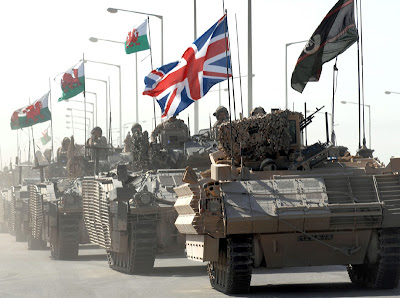
After much thought, I concluded it would be pointless reviewing the media coverage on the
Thus, taking but one report at random,we find Gordon Brown last night insisted that the withdrawal is a "pre-planned and organised' effort to hand over control to the Iraqis", and the move to Basra Air Station is simply a "redeployment". "This is essentially a move from where we were in a combat role in four provinces, and now we are moving over time to being in an overwatch role," says Brown.
And who said "spin" was dead?
Talking of spin, the pictures of the military convoy (supplied by the MoD), banners and flags rampant, looked for all the world like a victory procession, rather than an ignominious retreat. However, the fact that British forces were able to make the journey without disruption was due to the "safe conduct" they had been granted by the militias is quietly ignored. Spin is hardly confined to the politicians.
As to whether the politicians and the military are merely deluding themselves, if they are arging that this is anything other than a retreat, according to a poll for BBC2's Newsnight more than two-thirds of the public think British troops are losing the war in Iraq, and more than half believe the war is already lost.
Some "military sources" are also conceding that Britain's "overstretched forces" had effectively been forced to "do a runner", one such being Colonel Bob Stewart, who adds that Basra is still lawless after four years of British occupation and the Iraqis were not ready to take control of Basra.
 With the retreat of the military, however, also comes the retreat of the media. It was interesting to note that the bulk of the media reports from "on-the-spot" reporters, came not from Basra but from the safety of the "green zones" in Baghdad. We will, therefore, get very little first-hand information of what is happening in the aftermath of the retreat – and what we were getting was thin enough.
With the retreat of the military, however, also comes the retreat of the media. It was interesting to note that the bulk of the media reports from "on-the-spot" reporters, came not from Basra but from the safety of the "green zones" in Baghdad. We will, therefore, get very little first-hand information of what is happening in the aftermath of the retreat – and what we were getting was thin enough.But, if you want a recent historical parallel, look to al Amarah. In 2003, British forces occupied the centre of the city, with their base in Cimic House – the former governor's residence. After the epic battles during the Mahdi uprising in 2004, the Army quietly withdrew to the outskirts, hunkering down in Camp Naji, where it was mercilessly mortared and rocketed, until its full-scale retreat last year.
Now, who really knows what is going on in al Amarah? Ostensibly under Iraqi control, for all we know the militias are running things – we simply do not know.
That, most probably, will be the fate of Basra. Our forces five miles outside the city, might as well be 500 miles, for all the information they will be getting. Short of full-scale war, therefore, we are unlikely to hear very much of the goings-on, which means, for the time being at least, Brown will be able to maintain the fiction that the City is under control.
The picture above, however, is one to keep and treasure. It is all rather reminiscent of our retreat from Aden, almost exactly 40 years ago when, in November 1967, British forces pulled out, marching six abreast with flags flying, never to return.
I have cross-posted this on Defence of the Realm.
COMMENT THREAD
No comments:
Post a Comment
Note: only a member of this blog may post a comment.